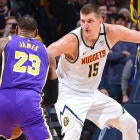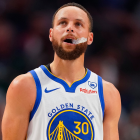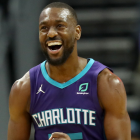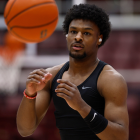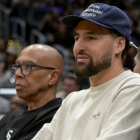
The Lakers have gone out of their way to deny this, but they assumed as much as the rest of us that they were destined for a Western Conference finals matchup against the Clippers. It was obvious in the way that they treated those matchups all season, four all-out battles surrounded by regular-season mundanity. They jogged their last seven seeding games, but the first one against the Clippers? That was a tune-up for a series we now know we'll never get to see.
Instead of the Clippers, the Lakers face a Denver Nuggets team that has now survived back-to-back 3-1 deficits (a state of affairs LeBron James knows all too well), and while the matchup is certainly more favorable on paper, it isn't the one they spent the season preparing for. So what does that mean for the series itself? Without all of that buildup, these teams will have only a matter of days to build a strategy for the Western Conference finals. These are the seven questions whose answers will determine whether the Lakers or Nuggets advance to the NBA Finals.
1. Big? Small? Or something in between?
The Lakers were too big for most of the season. They spent more than 37 percent of their total minutes with both Anthony Davis and a center on the floor, and it turned them into an offensive battering ram. The Lakers made 22 shots per game in the restricted area during the regular season, most in the league by such a laughable margin that the gap between them and No. 2 New Orleans was identical to the gap between those Pelicans and the No. 11 Grizzlies. The trade-off here, obviously, was shooting. The Lakers finished 21st in 3-point percentage and 22nd in 3-point attempt rate, numbers foreign to LeBron teams.
The Houston series was an overcorrection in that sense. With Davis on the floor, the Lakers maintained a somewhat normal lineup orientation, but their refusal to play centers at all when he went to the bench unlocked super small lineups they'd never even considered. The fivesome of James, Rajon Rondo, Alex Caruso, Kyle Kuzma and Markieff Morris didn't play a single regular-season minute together. It wound up outscoring the Rockets by 24 points in 27 minutes by, you guessed it, bombing 3-pointers.
Rondo and Morris aren't going to be Splash Brothers forever (and we'll dive into that more in a bit), but for the first time, Frank Vogel has been drawn away from the bully-ball identity the Lakers clung to all season. He indicated to reporters Wednesday that he plans to start bigger than he did against Houston, but offered no specifics. What he's looking for is a middle ground. The Nuggets aren't the Rockets. The Lakers aren't going to treat them as such. But he's seen how effective smaller groups can be, and the Nuggets aren't in a position to dictate matchups in the same way the Rockets were. The Lakers can control the terms of engagement here, and in truth, that gives Vogel three separate decisions to make rather than just one. The balance between playing big and playing small will come down to when he uses each.
- The starting lineup, in all likelihood, involves a center (with JaVale McGee getting first crack). Vogel knows that Davis is going to have to defend Jokic eventually, but stealing a few easier minutes for him early in halves will help keep him fresh and out of foul trouble later.
- The closing lineup will almost certainly not involve a center. Davis-at-center lineups blasted the Nuggets by 34 points in 56 minutes this season, and Vogel has tended to close without big men outside of the occasional Dwight Howard cameo.
- Davis' bench minutes will probably see a combination of both, but leaning toward the smaller groups LeBron led against Houston. Jokic will probably scare the Lakers out of playing Morris at center, but Mason Plumlee won't, and Denver's substitution patterns align nicely in that regard as Davis and Jokic both tend to take their breaks in the second and fourth quarters.
This, broadly, should be the expectation, but we'll need to dive deeper into each point in the game to understand what will go into Vogel's choices, starting with the game's most important minutes.
2. How on Earth are the Nuggets going to defend the Lakers in the fourth quarter?
Spoiler alert: You'd better get used to two basic Lakers actions, because they're all you're going to see if these games are close late in the fourth quarter. The first is the LeBron James-Anthony Davis pick-and-roll. The concept here is simple. The Nuggets have fairly immobile and ground-bound big men. They like to show on screens, and LeBron James is one of the greatest pick-and-roll passers in history. Jump out onto the perimeter against him and he's going to drop it right in Davis' pocket for the easy finish:
Even when the paint is packed, the Lakers have a third dimension to exploit. Davis is going to kill the Nuggets on lobs because Jokic can't challenge him vertically. Few teams can:
The play itself is lethal, but what it sets up is downright cruel. The Lakers' true finishing move is using the screener to allow LeBron to hunt for the matchup he wants in isolation. We've already seen this play out against Denver. That matchup is Jokic, and he obliterated him. LeBron can get too cute after forcing bigs to switch onto him, doing the dribble dance for several seconds before settling for a 3, but Jokic is so slow that James can't help himself. He attacks the basket every time:
Even when Jokic manages to get into position at the basket, he's so limited as a rim protector that LeBron scores with ease anyway:
Denver allowed opponents to shoot 65.4 percent in the restricted area this season, and while it has been better in the playoffs, most of that improvement boils down to opponent. The Clippers struggled to score inside even at full strength. With Montrezl Harrell out of shape? Even the Nuggets were in OK shape. Playoff LeBron isn't exactly unconditioned Harrell, and that's unfortunate for the Nuggets, because they were already at a loss against regular-season LeBron. Since joining the Lakers, LeBron has shot 42 of 51 in the restricted area against the Nuggets. That's 82.3 percent. Oof.
This is the biggest reason Davis will close games at center. The Lakers don't want to give the Nuggets any outs through doubles or softer help. They want three shooters getting out of LeBron's way while he works. Contenders have spent the past decade trying and failing to counter this finisher, and the Nuggets are among the least-equipped opponents ever try to. Yet if they want to reach the Finals, they're going to have to be the team that cracks the LeBron code. Good luck with that.
3. Who's guarding Jokic in the post?
Let's put the difference between the Lakers and Clippers into perspective. The Clippers, so devoid of defense out of their big men, were forced to throw 29 post-doubles at the Nuggets (mostly on Jokic) in their second-round series, according to Synergy Sports. Not an ideal strategy against the best passing big man in NBA history. Jokic carved them to shreds:
Something tells me the Lakers won't have to worry about this. They used 67 hard doubles in the post throughout the entire regular season. The Lakers don't intentionally double. On the rare occasions Jokic managed to draw one against them, it came as a response to the sort of desperate switches that Vogel will be able to scheme out of this series:
Those easy buckets Jokic generated against the Clippers? They're gone in this matchup. Jokic is going to have to beat his man straight up, and his man, a lot of the time, is going to be the Defensive Player of the Year runner-up. That's sort of an issue for Jokic, who's shot 7 of 21 from the field with Davis guarding him over the past three seasons. He had as many turnovers with Davis on him this season as he did field goals:
The Davis-Jokic post war is going to be the endgame of this series, but it's something the Lakers would probably prefer to avoid in the early stages for a multitude of reasons. Fouls and exhaustion are among them, but primarily, it allows them to maintain the integrity of their defensive scheme. The Lakers prefer to unleash both LeBron and Davis as help defenders, slotting them against off-ball players they can help off to muck up everything else an offense does until matching them up with opposing stars becomes absolutely necessary. Denver makes this relatively easy. Jerami Grant and Paul Millsap probably aren't going to punish wandering defensive eyes.
So this begs the question: Can JaVale McGee and/or Dwight Howard hold up against Jokic? The answer is ... maybe. The tape is promising. Both managed to hold their own against Jokic during the regular season. But McGee's overall defensive numbers in the post are terrible. He allowed 1.2 points per post-up possession this season, whereas Howard allowed only 0.667. Sample size played a role in that, but it's also somewhat intuitive. Howard is physically stronger and more disciplined:
Vogel probably won't be radical enough to start Howard in Game 1, but McGee is going to have a quick hook here, and don't be surprised if Howard is one of the first reserves off the bench. If the Lakers really do plan to devote some of their LeBron-plus-bench minutes to small ball, the first and third quarters would be Howard's time to shine.
4. What happens when the Nuggets ignore the Lakers' non-shooters
The Lakers reserves do a lot of things well. They tend to have high basketball IQs, they've defended well in the postseason and they manage to generate off-ball movement that the starters typically miss. But to a man, they're all below-average shooters. Literally. Caruso, Morris, Rondo and Kuzma are all below the 35.8 percent NBA average behind the arc for the season. Only Caruso is better for his career, and sample is behind that. Yet the Rockets series was won, in part, behind Rondo and Morris shooting well beyond their means.
The Rockets facilitated that explosion by refusing to guard them in favor of packing the paint. Statistically, it was the right play, and Denver is going to emulate it. After all, Markieff is the inferior Morris twin. The Nuggets allowed Marcus Morris, an above-average shooter who topped 40 percent for the season, 18 wide-open 3-point attempts in the second round. He made 10 of them, but they never wavered. Denver was determined not to guard him for the sake of offering more help at the basket. Even in Game 7, it gave him looks like this:
If that's how they treated Marcus, it's a safe bet that Markieff isn't getting much attention. Rondo and Caruso will both have their fair share of open looks as well. They might make them, and if they do, the series is over. But the Houston series hid the scarier truth that they probably won't, and all of a sudden, bench points become much harder for the Lakers to come by.
The Lakers did a good job of using LeBron as a decoy in those lineups to maximize Rondo's prodigious passing. Watch as he draws the defense's eyes on a perceived handoff that turns into a free cut at the basket for Morris:
We're probably going to have to see a lot more of this to compensate for the drives that the Denver bench will try to take away from LeBron. Fortunately for them, the Nuggets have weak spots to exploit.
5. Can Michael Porter Jr. hang on defense?
The Lakers don't cut often, but when they do, they're deadly. They've scored 1.4 points per possession off cuts in the playoffs, most of which come from the reserves. Rondo just spent an entire series carving up the Rockets as a passer, and their defenders are grownups.
Michael Porter Jr. is a rookie, and like most rookies, he doesn't know how to navigate screens yet. This was on display the last time these teams met, when an Anthony Davis screen essentially removed Porter from a play that resulted in a Kyle Kuzma 3-pointer:
It gets a lot more complex than this. Ask Porter to think in traffic on defense and more often than not, he's going to make the wrong call:
His improved effort has been commendable as the postseason has progressed, but there's a reason rookies don't usually play this late into the postseason. Porter isn't ready for this. That much was obvious when the Nuggets took him out of the starting lineup against the Jazz.
The catch is that he needs to be ready for this, because the Lakers are so prepared to defend Jokic and Jamal Murray. The Lakers are going to win the star battle. Denver's chance at closing the gap is their role players, and if Porter is getting roasted defensively to the degree that he becomes unplayable, his potentially game-changing offense is going to get relegated to the bench. The Lakers are just fine with that, and it is just one of the many ways that they could control the tenor of this series.
6. Who controls the pace of play?
Usually, the younger team plays fast while the veterans want to slow things down. This series is an anomaly in that regard. The older Lakers are desperate to run, finishing second in fastbreak points during the regular season. The Nuggets were 28th in pace, and while their transition defense was around league-average, it wasn't exactly an area they devoted many resources to. Rather than getting back on defense, the Nuggets emphasize offensive rebounding.
To their credit, they were the third-best offensive rebounding team in basketball, but that's going to pose a number of challenges in this series. A big one is going to come in the form of LeBron's hit-ahead passes. When the Lakers play big they can afford to excuse Davis from rebounding duties so he can leak out for easy transition buckets. This becomes significantly easier when possible defenders are still focusing on offense:
Still, the numbers overwhelmingly favor the Nuggets in the pace battle. They held the Lakers to below 96 possessions per game during their regular-season bouts, a steep drop-off from their 101.2 average. Playoff games are universally played at a slower pace than their regular-season counterparts, and the Lakers have even slowed down a bit during the postseason. But between LeBron and Rondo, the Lakers are going to look to run whenever possible.
One trick they leaned on during the regular season was pushing the pace even off made shots. The advantage there is that the center is usually the last person down the floor, giving Davis a mismatch in the post. See what he does to Robert Covington here? Jokic can be so slow down the court that he'll likely get similar looks against Grant, Millsap and Torrey Craig:
This is a specialty of Rondo's as well, but in different ways. He's always on the lookout for sleeping defenders after made baskets because that's when they're usually easiest to find:
But the pace of this series is going to be determined by the turnover battle. The Nuggets commit the seventh-fewest turnovers in the NBA. The Lakers force the fifth most, and it's what the Rondo-Caruso duo does best:
That defensive aggression is going to prove critical in another component of the Lakers game plan, and it's an area that the Clippers and Jazz failed in.
7. What is Frank Vogel cooking up for Jamal Murray?
It says quite a bit about the players who the Lakers have faced to this point that Jamal Murray is, at best, the third-best guard on their postseason slate. Frank Vogel solved the James Harden puzzle with late traps, knocking him out of possessions with a single pass. The first round was a bit simpler. The Lakers trapped Damian Lillard only five times in their three first-round victories over him. Gimmicks weren't necessary. Alex Caruso held Lillard and CJ McCollum to only 11-of-31 shooting in the series. For the postseason, the Lakers have allowed 98.8 points per 100 possessions with him on the floor.
Expect their approach to Murray to be somewhere in between. He doesn't warp defenses in the ways that Harden does, but Lillard didn't have Murray's dance partner. Solving the two-man game between Jokic and Murray is going to be the key to stopping the Nuggets, and given their lengthy menu of pick-and-roll, hand-off and give-and-go options, the Lakers may need a game or two to solve it. Ball denial from Caruso will be their first choice.
Some more exotic options? Don't be surprised to see some of the box-and-one zone that Toronto used to confound Kemba Walker in the second round, especially during Jokic's rests. The Lakers tinkered with it against Eric Gordon in Houston's bench minutes, and they also deployed a 1-2-2 zone to great effect.
How about sticking LeBron on Jokic, switching their screens, and then throwing an immediate double at the big man just to give Caruso a moment to scurry out of the matchup? If the ball gets to Jokic, those are free points, but that's a mighty big "if" when LeBron is involved.
The Lakers will let the base matchup play out in Game 1 as they typically do before deciding how wild to get from there. If they draw the right version of Murray, they might not need to. Between Game 7 against the Jazz and Game 5 against the Clippers, he averaged only 19 points on 36.8 percent shooting. Murray continues to run hot and cold, and if the Lakers can avoid a hot streak, they're going to advance to the NBA Finals.
Prediction
The Nuggets are bringing a knife to a LeBron fight. That's an oversimplification, but in the last decade, think of the players who have actually managed to take down King James. Dirk Nowitzki. Kawhi Leonard. Stephen Curry and Kevin Durant joined forces to do it. That's three MVPs and a two-time Finals MVP. Yes, Jokic just beat one of them, but he did so with matchup advantages that won't be replicated this time around. Against the Lakers, Jokic is just a star.
And against the Nuggets, LeBron is something more. So, too, is Anthony Davis. Having the two best players in a series isn't, in itself, an automatic victory, but when those players also have great matchups? It takes complementary talent that the Nuggets simply don't have. Murray may or may not show up. But James and Davis absolutely will, and that is going to be enough. Lakers in five.









